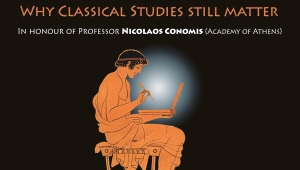
23. - 26. November 2022
International Conference
In honour of distinguished Professor Nicolaos Conomis, Member of the Academy of Athens
Wednesday – Friday, November 23 - 25, East Hall of the Academy of Athens
Saturday, November 26, The Acropolis Museum
Beginning: November 23, 17:00
Conference organizers:
- Antonios Rengakos (Academy of Athens & Aristotle University of Thessaloniki)
- Theodoros Papanghelis (Academy of Athens & Aristotle University of Thessaloniki)
- Georgios K. Giannakis (Aristotle University of Thessaloniki & Centre for the Greek Language)
It is more or less a truism to argue that ancient Greek and Roman antiquity have shaped our worldview and influenced the ways in which contemporary life and values are understood and constantly (re)interpreted. The imprint of the Greco-Roman past is evident in many aspects and features of our culture: the sciences and arts, linguistic forms, literary expressions, religion, morality and ethics, philosophical thinking, political theory and practice, and the ways we think about and understand history and humanism. In a nutshell, the Greco-Roman past decisively affects the ways in which we, moderns, despite ethnic or cultural differences, understand ourselves. There are, however, those, both outside and within the confines of Classical Studies, who wonder whether it is worth investing time, effort, and resources in studying the past.
This conference, the result of collaboration between the Academy of Athens and the Heidelberg Academy of Sciences and Humanities, aims to address the important question of the relevance of Classical Studies today: do they still matter, and to whom? Some of the most influential scholars of ancient Greece and Rome will come together at the Academy of Athens to discuss a wide range of issues that highlight the modernity of the past and help us better and more fully understand the position of Classical Studies in the 21st century, the challenges, and the prospects. Among the topics brought under examination by the contributors are: 1. the history of the field of Classical Studies from antiquity to modern times; 2. patterns of politics and socio-culture; 3. the cultural importance of monuments and artifacts; 4. language and linguistics; 5. education (addressing the debate over how academic units and programs could be restructured to include both traditional and innovative approaches to philology and ancient civilizations); 6. matters of interdisciplinarity and intertextuality; and 7. aspects of modernity (including digitalization and the use of new technologies in teaching and researching the past).
Event page with program and further information
PLEASE NOTE: THERE IS CURRENTLY A TECHNICAL PROBLEM AND THE TIME OF THE EVENTS IS DISPLAYED INCORRECTLY WITH iCAL. PLEASE REFER TO THE RESPECTIVE EVENT PAGES FOR THE CORRECT TIMES.

